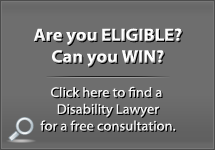
After you’ve filed your application for Social Security benefits, you’ve received a letter in the mail notifying you that the Social Security Administration (SSA) is sending you out to a disability examination with a doctor. The letter states it is to obtain medical information for a disability determination. The examination has been arranged at SSA’s expense to obtain “needed information.” It is very important you attend this exam, as failure to attend could result in a denial of benefits.
Some people believe this exam’s purpose is to provide medical treatment. This is wrong. The exam is not intended to treat you for any physical or mental condition. SSA needs specific medical evidence to determine whether you are disabled. The consultative examination (CE) is simply an evaluation to see what your current medical conditions are, and to have a doctor determine how severe these conditions may be at the present time. The CE is usually conducted in less than thirty minutes. The doctor may use his staff, nurse, or other assistant to help complete forms and take your vital signs. The doctor is not required to report to you his findings, diagnoses, or evaluation of your disabilities. He will send a written report to SSA of his findings.
A CE is not a substitute for medical treatment. It is crucial for you to be in treatment with your own doctor or health care professional. SSA requests the consultative examination when your medical sources cannot or will not give SSA sufficient medical evidence about your impairment for them to determine if you are disabled or blind.
Things to remember about a CE:
- It’s not meant to be the same as a treating relationship with your own doctor, it’s a medical expert Social Security has hired to give them a report on how you are doing.
- Be friendly and honest with the doctor, like in a disability hearing exaggeration can hurt your chances.
- If anything really unprofessional happens in a CE be sure to tell your representative (or lawyer) about it as there are ways to object to a CE.










